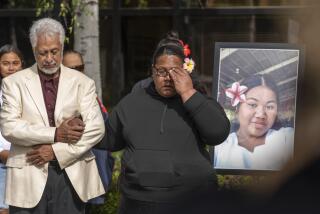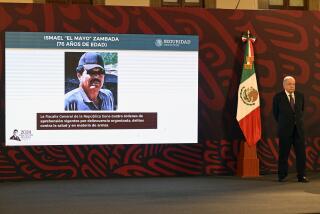Numerous red flags arose in months leading to Fort Lauderdale airport shooting
- Share via
Reporting from Fort Lauderdale, Fla. — Authorities in Anchorage confiscated a gun from the accused Fort Lauderdale airport shooter after he came to an FBI office in November acting bizarrely and speaking of “terroristic thoughts.” But police gave the weapon back to him less than a month ago, authorities in Alaska said Saturday.
Emerging details raise troubling questions about why Esteban Santiago was allowed to have and keep a gun, and then check it on a flight.
Red flags were many in the months leading up to Friday’s rampage and even on the day Santiago boarded a plane to begin his journey to Fort Lauderdale. He bought a one-way ticket. Though traveling from wintry Alaska to balmy Florida, he stowed no luggage, checking only one item: a hard case containing a gun.
No gate agent or security official stood in his way.
Just two months earlier, he had told authorities he was delusional.
“Mr. Santiago had arrived at the FBI building asking for help,” Anchorage Police Chief Christopher Tolley said. “Santiago was having terroristic thoughts and believed he was being influenced” by Islamic State.
Yet Santiago was not on a government list of people prohibited from flying, set up after the Sept. 11, 2001, terrorist attacks.
Fort Lauderdale airport shooting
“During our initial investigation, we found no ties to terrorism,” said Marlin Ritzman, the agent in charge of the FBI’s office in Anchorage. “He broke no laws when he came into our office making comments about mind control.”
The 26-year-old Santiago, an Iraq war veteran and an Anchorage resident, was agitated and incoherent when he visited the FBI office Nov. 7. He had a loaded magazine on him, but left his gun and infant son in a car, Ritzman said. Santiago told agents he did not wish to harm anyone.
The FBI contacted the Anchorage Police Department, which transported Santiago to a mental health facility. The department took his weapon and “logged it into evidence for safekeeping,” Tolley said.
Authorities would not say whether it was the same semiautomatic handgun used to kill five people at the baggage claim area of the airport.
The FBI closed its assessment of Santiago after reviewing government databases and checking interactions with law enforcement around the country. “He was a walk-in complaint,” Ritzman said. “This is something that happens at FBI offices around the country every day.”
The Associated Press in Puerto Rico reported Saturday that Bryan Santiago questioned why his brother was allowed to have his gun when federal authorities knew he had become increasingly paranoid and was hearing voices.
“The FBI failed there,” he said. “We’re not talking about someone who emerged from anonymity to do something like this.”
The Associated Press reported that Esteban Santiago, after the incident at the FBI office, had been held for four days for treatment and was released without medication or follow-up therapy.
Like many states, Alaska permits people to be held for up to 72 hours for a mental health evaluation. They can be committed longer with court approval.
Ten days after the visit to the FBI, on Nov. 17, police sent Santiago a letter asking him to pick up his gun, and an appointment was set for Nov. 30. When he showed up, however, the gun was not returned to him. Tolley did not say why. The firearm was finally released to him on Dec. 8, the police chief said.
Four weeks later, on Thursday night, Santiago boarded a Delta flight in Anchorage. Once in Fort Lauderdale, he recovered the gun at baggage claim, went into a bathroom, loaded the weapon and came out firing at people, police said.
“Our hearts go out to the families of the five who lost their lives,” Tolley said Saturday.
Alaska U.S. Atty. Karen Loeffler said federal law required that a person be adjudicated mentally ill by a court in order to be prohibited from possessing a gun. She said she knew of nothing in Santiago’s background that fit that exclusion criteria.
Louis Cohen, an advocate with the Fort Lauderdale chapter of the Vietnam Veterans of America, said Delta employees should have questioned why a man “going to another climate from Alaska” had no suitcase and was checking only a handgun to Florida. “The answer could have been a clue,” he said.
Miami security expert Wayne Black said authorities had to do more to “connect the dots” when someone comes to law enforcement acting strangely and talking of terrorism. “We’ve got to keep them off planes with guns,” he said.
Medical privacy laws, he said, complicate the ability to make good judgments about people, but Santiago’s domestic violence history should have raised red flags. “It’s the perfect storm,” he said.
Anchorage police had dealt often with Santiago in the preceding year. Tolley listed several police calls involving Santiago, but did not give specifics.
On Jan. 11, police responded to a “physical disturbance” and an arrest warrant was issued against him for criminal mischief. In February, he was found to have violated conditions of his release because he’d been barred from his home, but officers found him there during a compliance check. He was jailed.
In March, another physical disturbance call was made to police, but officers could not establish probable cause to arrest him, the chief said.
On Oct. 15, officers investigated a domestic violence matter that also did not lead to arrest. Less than a week later, police received an allegation involving strangulation, but again, no arrest was made.
Court records show Santiago was charged in January 2016 in Alaska in a criminal mischief case involving the destruction of property and threats to an individual, a misdemeanor. Prosecutors dropped the case in March as part of a deal in which he likely agreed to probation or some kind of treatment.
Media in Anchorage have described a case in which Santiago was accused by his girlfriend of bashing in a bathroom door, yelling and attempting to strangle her.
Federal law prohibits people with misdemeanor domestic violence convictions from possessing firearms, but the ban does not apply if the victim was not a spouse or the couple did not have a child together, said Hannah Shearer, staff attorney with the Law Center to Prevent Gun Violence. Records do not show a conviction against Santiago for domestic violence and he became a father only in September.
The Coalition to Stop Gun Violence, a Washington, D.C., advocacy group, called Saturday for greater protections, noting that California and Washington state recently enacted laws allowing courts to temporarily remove firearms from people displaying dangerous signs.
The organization said Santiago’s history of domestic violence and apparent descent into crisis should have raised sufficient concern to confiscate his guns for a time.
John Snook, executive director of the Treatment Advocacy Center, which presses nationally for better mental health care, said the tragedy illustrated “how broken our mental health system is in many parts of the country.”
He said in most places, including Alaska, someone complaining of delusions, even going into an FBI office and doing so, is going to be released from a mental health facility rather quickly, unless they seem to pose an immediate threat of danger.
Santiago left Puerto Rico several years ago because of the lack of adequate medical services for veterans, particularly mental health care, Nelson Cruz, a senator from Puerto Rico, told the Sun Sentinel newspaper in Florida.
Puerto Rico has a Veterans Affairs hospital and other facilities, but some, including Cruz, say the services are underfunded and understaffed to serve the needs of the island’s veterans.
“I believe this could have been avoided if Esteban had access in Puerto Rico to the same services that other veterans have in [other parts of] the U.S.,” Cruz said. “One of the reasons that he left Puerto Rico was to seek better services [for his mental health issues]. I’ve heard this from other veterans here.”
Santiago was suffering from mental issues when he returned from his National Guard tour in Iraq in 2011. The family said he was hearing voices and sometimes hallucinating, according to Cruz.
Bryan Santiago, a boxing trainer, told the senator that his brother had been receiving psychological treatment in Anchorage and described him as “functional.”
Cruz said he had known Esteban Santiago since he was a child and last saw him about seven years ago.
“A very intelligent young man, well-educated, a Christian and an athlete,” Cruz said. “He was a good son and very faithful to his older brother, who he adored.”
Cruz said he called the family Friday night to offer his support and that he prayed with Bryan and his mother over the phone.
“I spoke to Bryan last night and he said, ‘We’re very sad and we want to express our solidarity with the victims and their families,’” said Cruz on Saturday by phone from Puerto Rico’s Legislature in San Juan. “They are a very Christian family and are taking refuge in their faith.”
More to Read
Sign up for Essential California
The most important California stories and recommendations in your inbox every morning.
You may occasionally receive promotional content from the Los Angeles Times.










